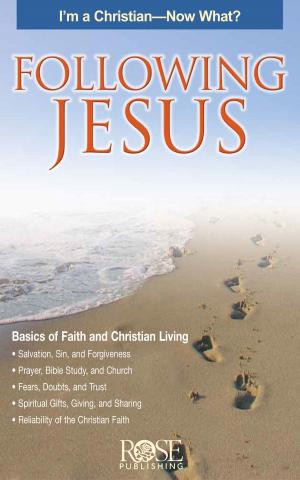| Author: | Rose Publishing | ISBN: | 9781628621112 |
| Publisher: | Rose Publishing, Inc. | Publication: | July 7, 2014 |
| Imprint: | Rose Publishing, Inc. | Language: | English |
| Author: | Rose Publishing |
| ISBN: | 9781628621112 |
| Publisher: | Rose Publishing, Inc. |
| Publication: | July 7, 2014 |
| Imprint: | Rose Publishing, Inc. |
| Language: | English |
The Spiritual Disciplines Pamphlet explains the classic spiritual disciplines that help us follow Jesus: Scripture reading, prayer, fasting, worship, solitude, and evangelism. The Spiritual Disciplines Pamphlet makes an excellent handout or Bible study on Christian maturity for a small group or Sunday school class.
It addresses questions such as:
What does it mean to be Jesus' disciples in the twenty-first century?
Do spiritual disciplines look different in an electronic age?
How can spiritual disciplines be a joy, not a legalistic burden?
Includes an explaination and advice on these Spiritual Disciplines:
• Bible Reading/Study
• Prayer
• Fasting
• Worship
• Service
• Solitutude
• Discernment
• Evangelism
Each Spiritual Discipline includes:
• Examples from people in the Bible
• Tips for getting started
• How each discipline helps us to have a Christ-focused life
Discussion Questions
• Scripture Reading: Read two of the Bible passages from the list on page 5. In your opinion, what is the message of these passages? Read the section on “The Disciplines Today.” Some people love to read the Bible; others see it as a challenge. What ideas might work for those who struggle?
• Prayer: Read one of the Psalms listed at the top of page 6 and pick one other Bible passage in that section. What is the writer of the Psalms expressing in his prayer? Is he being honest with God about his emotions and problems? In what way does this change your view of prayer? What attitude should we have? What kinds of prayers should we avoid? Pick one of the ideas in “The Disciplines Today” and share how you might apply it.
• Fasting: Choose two of the passages at the top of page 8 to read. Why did these people choose to fast? Now look at the quote. How can we keep our focus on the right thing? Fasting is one of the most neglected of the Spiritual Disciplines, but it is excellent for teaching us self-control. Look at the tips. How might you practice the discipline of fasting?
• Worship: People worship in many ways as we can see from the biblical examples at the top of page 9. Which of these suit your personality and circumstances the most? Look at the first point under “The Disciplines Today.” In practical ways, how can we develop the right attitudes? When we worship in a group, the experience is often different from our private times of worship. What are the benefits of each?
• Service: Jesus could have forced and bullied everyone into obeying him. Yet he did not. He chose to be a servant. Pick one of the passages from the Biblical Basis section at the top of page 10, and explain how Jesus' leadership is different from the kind of leadership found in the world today. Read the tips on page 10. How will you serve others in a way that imitates Jesus?
• Solitude: Many biblical leaders sought to be alone with God. Pick one of the examples on page 11 and note anything of interest to you. If you are the type of person who likes having a lot of noise in your life, how do you practice solitude? What are the benefits of going off by yourself and praying and resting?
• Discernment: Look at the examples of biblical discernment at the top of page 12. Read both of the last two bullet points in the Biblical Basis section. What does discernment mean and how does it look today? Some people seem to have the spiritual gift of discernment, but all believers can be more discerning in general. Why is it important to discuss issues with other believers?
• Evangelism: Read all of the points at the top of page 13. What did Jesus teach? Look at the tips. What do you see as the most important? It is often easiest and most natural to share your own story with close friends. Do you ever sense an opportunity to discuss spiritual matters?
Perfect for discipleship or small groups.
It addresses questions such as:
What does it mean to be Jesus' disciples in the twenty-first century?
Do spiritual disciplines look different in an electronic age?
How can spiritual disciplines be a joy, not a legalistic burden?
Includes an explaination and advice on these Spiritual Disciplines:
• Bible Reading/Study
• Prayer
• Fasting
• Worship
• Service
• Solitutude
• Discernment
• Evangelism
Each Spiritual Discipline includes:
• Examples from people in the Bible
• Tips for getting started
• How each discipline helps us to have a Christ-focused life
Discussion Questions
• Scripture Reading: Read two of the Bible passages from the list on page 5. In your opinion, what is the message of these passages? Read the section on “The Disciplines Today.” Some people love to read the Bible; others see it as a challenge. What ideas might work for those who struggle?
• Prayer: Read one of the Psalms listed at the top of page 6 and pick one other Bible passage in that section. What is the writer of the Psalms expressing in his prayer? Is he being honest with God about his emotions and problems? In what way does this change your view of prayer? What attitude should we have? What kinds of prayers should we avoid? Pick one of the ideas in “The Disciplines Today” and share how you might apply it.
• Fasting: Choose two of the passages at the top of page 8 to read. Why did these people choose to fast? Now look at the quote. How can we keep our focus on the right thing? Fasting is one of the most neglected of the Spiritual Disciplines, but it is excellent for teaching us self-control. Look at the tips. How might you practice the discipline of fasting?
• Worship: People worship in many ways as we can see from the biblical examples at the top of page 9. Which of these suit your personality and circumstances the most? Look at the first point under “The Disciplines Today.” In practical ways, how can we develop the right attitudes? When we worship in a group, the experience is often different from our private times of worship. What are the benefits of each?
• Service: Jesus could have forced and bullied everyone into obeying him. Yet he did not. He chose to be a servant. Pick one of the passages from the Biblical Basis section at the top of page 10, and explain how Jesus' leadership is different from the kind of leadership found in the world today. Read the tips on page 10. How will you serve others in a way that imitates Jesus?
• Solitude: Many biblical leaders sought to be alone with God. Pick one of the examples on page 11 and note anything of interest to you. If you are the type of person who likes having a lot of noise in your life, how do you practice solitude? What are the benefits of going off by yourself and praying and resting?
• Discernment: Look at the examples of biblical discernment at the top of page 12. Read both of the last two bullet points in the Biblical Basis section. What does discernment mean and how does it look today? Some people seem to have the spiritual gift of discernment, but all believers can be more discerning in general. Why is it important to discuss issues with other believers?
• Evangelism: Read all of the points at the top of page 13. What did Jesus teach? Look at the tips. What do you see as the most important? It is often easiest and most natural to share your own story with close friends. Do you ever sense an opportunity to discuss spiritual matters?
Perfect for discipleship or small groups.
The Spiritual Disciplines Pamphlet explains the classic spiritual disciplines that help us follow Jesus: Scripture reading, prayer, fasting, worship, solitude, and evangelism. The Spiritual Disciplines Pamphlet makes an excellent handout or Bible study on Christian maturity for a small group or Sunday school class.
It addresses questions such as:
What does it mean to be Jesus' disciples in the twenty-first century?
Do spiritual disciplines look different in an electronic age?
How can spiritual disciplines be a joy, not a legalistic burden?
Includes an explaination and advice on these Spiritual Disciplines:
• Bible Reading/Study
• Prayer
• Fasting
• Worship
• Service
• Solitutude
• Discernment
• Evangelism
Each Spiritual Discipline includes:
• Examples from people in the Bible
• Tips for getting started
• How each discipline helps us to have a Christ-focused life
Discussion Questions
• Scripture Reading: Read two of the Bible passages from the list on page 5. In your opinion, what is the message of these passages? Read the section on “The Disciplines Today.” Some people love to read the Bible; others see it as a challenge. What ideas might work for those who struggle?
• Prayer: Read one of the Psalms listed at the top of page 6 and pick one other Bible passage in that section. What is the writer of the Psalms expressing in his prayer? Is he being honest with God about his emotions and problems? In what way does this change your view of prayer? What attitude should we have? What kinds of prayers should we avoid? Pick one of the ideas in “The Disciplines Today” and share how you might apply it.
• Fasting: Choose two of the passages at the top of page 8 to read. Why did these people choose to fast? Now look at the quote. How can we keep our focus on the right thing? Fasting is one of the most neglected of the Spiritual Disciplines, but it is excellent for teaching us self-control. Look at the tips. How might you practice the discipline of fasting?
• Worship: People worship in many ways as we can see from the biblical examples at the top of page 9. Which of these suit your personality and circumstances the most? Look at the first point under “The Disciplines Today.” In practical ways, how can we develop the right attitudes? When we worship in a group, the experience is often different from our private times of worship. What are the benefits of each?
• Service: Jesus could have forced and bullied everyone into obeying him. Yet he did not. He chose to be a servant. Pick one of the passages from the Biblical Basis section at the top of page 10, and explain how Jesus' leadership is different from the kind of leadership found in the world today. Read the tips on page 10. How will you serve others in a way that imitates Jesus?
• Solitude: Many biblical leaders sought to be alone with God. Pick one of the examples on page 11 and note anything of interest to you. If you are the type of person who likes having a lot of noise in your life, how do you practice solitude? What are the benefits of going off by yourself and praying and resting?
• Discernment: Look at the examples of biblical discernment at the top of page 12. Read both of the last two bullet points in the Biblical Basis section. What does discernment mean and how does it look today? Some people seem to have the spiritual gift of discernment, but all believers can be more discerning in general. Why is it important to discuss issues with other believers?
• Evangelism: Read all of the points at the top of page 13. What did Jesus teach? Look at the tips. What do you see as the most important? It is often easiest and most natural to share your own story with close friends. Do you ever sense an opportunity to discuss spiritual matters?
Perfect for discipleship or small groups.
It addresses questions such as:
What does it mean to be Jesus' disciples in the twenty-first century?
Do spiritual disciplines look different in an electronic age?
How can spiritual disciplines be a joy, not a legalistic burden?
Includes an explaination and advice on these Spiritual Disciplines:
• Bible Reading/Study
• Prayer
• Fasting
• Worship
• Service
• Solitutude
• Discernment
• Evangelism
Each Spiritual Discipline includes:
• Examples from people in the Bible
• Tips for getting started
• How each discipline helps us to have a Christ-focused life
Discussion Questions
• Scripture Reading: Read two of the Bible passages from the list on page 5. In your opinion, what is the message of these passages? Read the section on “The Disciplines Today.” Some people love to read the Bible; others see it as a challenge. What ideas might work for those who struggle?
• Prayer: Read one of the Psalms listed at the top of page 6 and pick one other Bible passage in that section. What is the writer of the Psalms expressing in his prayer? Is he being honest with God about his emotions and problems? In what way does this change your view of prayer? What attitude should we have? What kinds of prayers should we avoid? Pick one of the ideas in “The Disciplines Today” and share how you might apply it.
• Fasting: Choose two of the passages at the top of page 8 to read. Why did these people choose to fast? Now look at the quote. How can we keep our focus on the right thing? Fasting is one of the most neglected of the Spiritual Disciplines, but it is excellent for teaching us self-control. Look at the tips. How might you practice the discipline of fasting?
• Worship: People worship in many ways as we can see from the biblical examples at the top of page 9. Which of these suit your personality and circumstances the most? Look at the first point under “The Disciplines Today.” In practical ways, how can we develop the right attitudes? When we worship in a group, the experience is often different from our private times of worship. What are the benefits of each?
• Service: Jesus could have forced and bullied everyone into obeying him. Yet he did not. He chose to be a servant. Pick one of the passages from the Biblical Basis section at the top of page 10, and explain how Jesus' leadership is different from the kind of leadership found in the world today. Read the tips on page 10. How will you serve others in a way that imitates Jesus?
• Solitude: Many biblical leaders sought to be alone with God. Pick one of the examples on page 11 and note anything of interest to you. If you are the type of person who likes having a lot of noise in your life, how do you practice solitude? What are the benefits of going off by yourself and praying and resting?
• Discernment: Look at the examples of biblical discernment at the top of page 12. Read both of the last two bullet points in the Biblical Basis section. What does discernment mean and how does it look today? Some people seem to have the spiritual gift of discernment, but all believers can be more discerning in general. Why is it important to discuss issues with other believers?
• Evangelism: Read all of the points at the top of page 13. What did Jesus teach? Look at the tips. What do you see as the most important? It is often easiest and most natural to share your own story with close friends. Do you ever sense an opportunity to discuss spiritual matters?
Perfect for discipleship or small groups.















